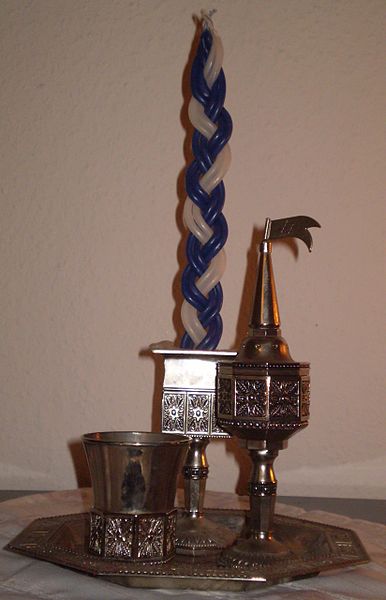
by Bonnie Beth Chernin
Judaica and the Good Find
 When I decided to stop at an outdoor flea market in Ocean County, New Jersey on the way to visit my parents in their retirement community, I recalled the pebbled blue havdalah spice box my mother had once rescued from entering an auction. The memory instinctively put me on alert for abandoned Judaica while I scoured folding tables full of old toy action figures, record albums, how-to-books, and discounted underwear still wrapped in plastic from a factory in Haiti.
When I decided to stop at an outdoor flea market in Ocean County, New Jersey on the way to visit my parents in their retirement community, I recalled the pebbled blue havdalah spice box my mother had once rescued from entering an auction. The memory instinctively put me on alert for abandoned Judaica while I scoured folding tables full of old toy action figures, record albums, how-to-books, and discounted underwear still wrapped in plastic from a factory in Haiti.
In the late 70s, the father-in-law of my mother’s friend died. Janice asked my mother to look at the remnants of his house before the items were tagged for an auction sale.
“It’s time for them to go,” Janice said. “We’ve sold his house, now we need to get rid of his stuff.”
My mother was a veteran of flea markets during the 70s. She bought ruby red Depression glassware if it was priced under five dollars. She was also known to walk away from any table whose owner didn’t bargain. My mother had an eye for value. She would turn over a cup and saucer to check its set mark, and she could tell real Depression glass from an imitation. So when my mother came home and told me she had reviewed the acquisitions of an older man of means, I fully expected to see one or two things she brought back as a “good find.”
What she showed me was a blue havdalah spice box with a brass flag on top and matching candlesticks for Shabbat. Yet we had never said havdalah in our house, and my mother didn’t need any more Shabbat candlesticks.
“I couldn’t let this get sold at an auction,” she said.
I thought at the ripe age of 17, I would now need to start saying havdalah, the Saturday night prayer that says good-bye to Shabbat and ushers in a new week. I was wrong. We continued to light Sabbath candles on Friday night, offering a warm hello to Shabbat, but we did not match it with a fond farewell, despite the addition of the spice box. My mother’s rescue stopped short of change.
Although we did not incorporate havdalah into our weekends, the spice box and candlesticks remained with my mother through three moves over thirty years and has become an intrinsic part of her dining room display, front and center on her wall unit shelf.
As I walked among the tables, my mind filled with the memory of my mother’s rescue. I scanned each table for a stray kiddush cup, lone menorah, or other Jewish items that might need saving from relentless sun and forgotten purpose.
Nothing turned up, but I realized my search had embraced my mother’s spirit of seeking treasure in another’s trash: look out for a “good find”—and our heritage.